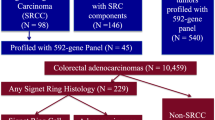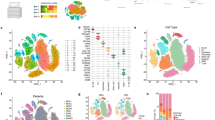Abstract
Signet ring cell (SRC) gastric cancer at advanced stage has poor prognosis. While a recent study reported nearly one-third of SRC cases contain tumors with deficient mismatch repair (MMR) genes, other studies in SRC have been inconclusive. To re-analyze the results, we performed immunohistochemical staining of MLH1, MSH2, MSH6 and PMS2 proteins in 38 SRC gastric tumors compared with 109 non-SRC (NSRC) tumors from 94 patients. In contrast to the previous study, all SRC gastric tumors normally expressed MMR proteins, whereas 22 of 109 of NSRC (20%) showed deficient MMR proteins. To reinforce our results, we referred to the Cancer Genome Atlas (TCGA) genomic database and found that only 6 (6%) of 99 samples with diffuse gastric tumors showed deficient MMR, whereas 64 (21%) of 304 in intestinal gastric tumors showed deficient MMR. Our results as well as the TCGA database indicated that MMR genes are infrequently inactivated in SRC gastric cancer. These findings indicate that SRC patients may not be the best candidates for immuno-oncology therapy.


Similar content being viewed by others
Abbreviations
- SRC:
-
Signet ring cell
- MMR:
-
Mismatch repair
- NSRC:
-
Non-signet ring cell
- TCGA:
-
The Cancer Genome Atlas
- PD-1:
-
Programmed death 1
- PD-L1:
-
Programmed death 1 ligand 1
- dMMR:
-
Deficient mismatch repair
- MSI:
-
Microsatellite instability
- IHC:
-
Immunohistochemistry
- MSI-H:
-
Microsatellite instability-high
- MSS:
-
Microsatellite stable
References
Jemal A, et al. Global cancer statistics. CA Cancer J Clin. 2011;61:69–90.
Hyung WJ, et al. Early gastric carcinoma with signet ring cell histology. Cancer. 2002;94:78–83.
Pernot S, et al. Signet-ring cell carcinoma of the stomach: impact on prognosis and specific therapeutic challenge. World J Gastroenterol. 2015;21:11428–38.
Okazaki T, Honjo T. PD-1 and PD-1 ligands: from discovery to clinical application. Int Immunol. 2007;19:813–24.
Yasumasa I,. Shibahara K, Honjo T, Agata Y. Induced expression of PD-1, a novel member of the immunoglobulin gene superfamily, upon programmed cell death. EMBO J. 1992;11:3887–95.
Yarchoan M, Hopkins A, Jaffee EM. Tumor mutational burden and response rate to PD-1 inhibition. N Engl J Med. 2017;377:2500–1.
Dung T. Le et al. Mismatch repair deficiency predicts response of solid tumors to PD-1 blockade. Science. 2017;357:409–13.
Iijima Y, et al. Very early response of circulating tumour-derived DNA in plasma predicts efficacy of nivolumab treatment in patients with non-small cell lung cancer. Eur J Cancer. 2017;86:349–57.
Lord CJ, Ashworth A. The DNA damage response and cancer therapy. Nature. 2012;481:287–94.
Alex D, et al. Evolution of instability at coding and non-coding repeat sequences in human MSI-H colorectal cancers. Hum Mol Genet. 2001;10:513–8.
Hause RJ, Pritchard CC, Shendure J, Salipante SJ. Classification and characterization of microsatellite instability across 18 cancer types. Nat Med. 2016;22:1342–50.
Gen Tamura, et al. Molecular characterization of undifferentiated-type gastric carcinoma. Lab Investig. 2001;81:593.
Seo HM, et al., Clinicopathologic characteristics and outcomes of gastric cancers with the MSI-H phenotype. J Surg Oncol 99, 143–147 (2009).
Kim H, et al. High microsatellite instability predicts good prognosis in intestinal-type gastric cancers. J Gastroenterol Hepatol. 2011;26:585–92.
Marrelli D, et al. Strong prognostic value of microsatellite instability in intestinal type non-cardia gastric cancer. Ann Surg Oncol. 2016;23:943–50.
Shenying J, et al. The PD-1, PD-L1 expression and CD3 + T cell infiltration in relation to outcome in advanced gastric signet-ring cell carcinoma, representing a potential biomarker for immunotherapy. Oncotarget. 2017;8:38850–62.
Hirotsu Y, et al. Comparison between two amplicon-based sequencing panels of different scales in the detection of somatic mutations associated with gastric cancer. BMC Genom. 2016;17:833.
Nakagomi T, et al. New therapeutic targets for pulmonary sarcomatoid carcinomas based on their genomic and phylogenetic profiles. Oncotarget. 2018;9:10635–49.
Hirotsu Y, et al. Multigene panel analysis identified germline mutations of DNA repair genes in breast and ovarian cancer. Mol Genet Genomic Med. 2015;3:459–66.
Gao J, et al. Integrative analysis of complex cancer genomics and clinical profiles using the cBioPortal. Sci Signal. 2013;6:pl1.
Wang K, et al. Exome sequencing identifies frequent mutation of ARID1A in molecular subtypes of gastric cancer. Nat Genet. 2011;43:1219–23.
N. Cancer Genome Atlas Research. Comprehensive molecular characterization of gastric adenocarcinoma. Nature. 2014;513:202–9.
N. Cancer Genome Atlas Research et al. Integrated genomic characterization of oesophageal carcinoma. Nature. 2017;541:169–75.
Wang K, et al. Whole-genome sequencing and comprehensive molecular profiling identify new driver mutations in gastric cancer. Nat Genet. 2014;46:573–82.
Cerami E, et al. The cBio cancer genomics portal: an open platform for exploring multidimensional cancer genomics data. Cancer Discov. 2012;2:401–4.
Chakravarty D, Gao J, Phillips S, Kundra R, Zhang H, Wang J, Rudolph JE, Yaeger R, Soumerai T, Nissan MH, Chang MT, Chandarlapaty S, Traina TA, Paik PK, Ho AL, Hantash FM, Grupe A,, Baxi SS, Callahan MK, Snyder A, Chi P, Danila DC, Harding JJ, Hellmann MD, Iyer G, Janjigian Y, Kaley T, Levine DA, Lowery M, Omuro A, Postow MA, Rathkopf D, Shoushtari AN, Shukla N, Voss MH, Paraiso E, Zehir A, Berger MF, Taylor BS, Saltz LB, Riely GJ, Ladanyi M, Gounder M, Hyman DM, Baselga J, Sabbatini P, Solit DB, Schultz N. OncoKB: a precision oncology knowledge base. JCO Precis Oncol. 2017. https://doi.org/10.1200/PO.17.00011.
Y-K Kang et al. Nivolumab in patients with advanced gastric or gastro-oesophageal junction cancer refractory to, or intolerant of, at least two previous chemotherapy regimens (ONO-4538-12, ATTRACTION-2): a randomised, double-blind, placebo-controlled, phase 3 trial. Lancet. 2017;390:2461–71.
Shu Y, et al. Prognostic significance of frequent CLDN18-ARHGAP26/6 fusion in gastric signet-ring cell cancer. Nat Commun. 2018;9:2447.
Alese OB, et al. Anaplastic lymphoma kinase (ALK) gene alteration in signet ring cell carcinoma of the gastrointestinal tract. Ther Adv Med Oncol. 2015;7:56–62.
Kakiuchi M, et al. Recurrent gain-of-function mutations of RHOA in diffuse-type gastric carcinoma. Nat Genet. 2014;46:583–7.
Acknowledgements
We thank Ms. Ritsuko Yokouchi and Ms. Naho Sato for data collection of the registry on all the malignant neoplasms at our hospital. We also thank all medical and ancillary staff of the hospital and the patients for consenting to participate. We thank Edanz Group (http://www.edanzediting.com/ac) for editing a draft of this manuscript.
Funding
This study was supported by a Grant-in-Aid for Genome Research Project from Yamanashi Prefecture (to M.O. and Y.H.), The Japan Society for the Promotion of Science (JSPS) KAKENHI Early-Career Scientists (Grant Number JP18K16292 to Y.H.), Research Grant for Young Scholars (to Y.H.), The YASUDA Medical Foundation (to Y.H.) and The Uehara Memorial Foundation (to Y.H.).
Author information
Authors and Affiliations
Corresponding author
Ethics declarations
Conflict of interest
All authors declare no competing interests.
Ethical approval
All procedures performed in studies involving human participants were in accordance with the ethical standards of the institutional research committee and with the 1964 Helsinki declaration and its later amendments or comparable ethical standards.
Informed consent
Informed consent was obtained from all individual participants included in the study.
Electronic supplementary material
Below is the link to the electronic supplementary material.
Rights and permissions
About this article
Cite this article
Hirotsu, Y., Mochizuki, H., Amemiya, K. et al. Deficiency of mismatch repair genes is less frequently observed in signet ring cell compared with non-signet ring cell gastric cancer. Med Oncol 36, 23 (2019). https://doi.org/10.1007/s12032-019-1246-4
Received:
Accepted:
Published:
DOI: https://doi.org/10.1007/s12032-019-1246-4




